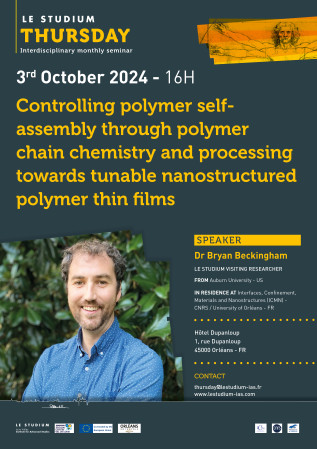Bryan Beckingham

From
Auburn University - US
In residence at
Interfaces, Confinement, Materials and Nanostructures (ICMN) - CNRS / University of Orléans - FR
Host scientist
Christophe Sinturel
BIOGRAPHY
Bryan S. Beckingham is the Mary and John H. Sanders Endowed Associate professor of Chemical Engineering, Director of the Center for Polymers and Advanced Composites, and Graduate Program Chair for Polymer & Fiber Engineering at Auburn University. He holds a Ph.D. and M.A. in Chemical and Materials Engineering from Princeton University and a B.S in Chemical Engineering from Clarkson University. Prior to joining Auburn, he was a Materials Postdoctoral Fellow at Lawrence Berkeley National Laboratory as a member of the Material Science Division and the Joint Center for Artificial Photosynthesis. His research is rooted in leveraging synthetic polymer chemistry, polymer processing, and materials characterization to inform the design of novel polymer materials for target applications, with particular emphasis on polymer membranes, hierarchically structured matter, and additive manufacturing polymer functional polymer systems.
PROJECT
Leveraging tunability of copolymer gradients during polymer synthesis to advance understanding of polymer self-assembly in confined geometries
Self-assembly of polymer materials provides a cost-effective route to preparation of materials with well-defined nanostructures (1-100 nm). Due to their ability to self-assemble, block copolymers are a particularly useful and important class of materials utilized in a wide range of applications including photonic crystals, ion conducting membranes, microfluidics, drug delivery, sensors, and nanoporous membranes, and templates for the organization of nanodots and nanowires. However, relationships between block copolymer chemistry, architecture, and thermodynamics are critical for understanding self-assembly behavior towards designing materials with target properties. This Studium research program will investigate the impact of incorporation of a gradient copolymer within the block copolymer architecture for enabling additional control over self-assembly behavior in polymer thin films and how these polymer thin films can be leveraged to fabricate porous thin polymer films. The approach will be to synthesize block and block-gradient copolymers with controlled molecular size and gradient structure and to then utilize these materials to create polymer thin films to investigate the self-assembly process and ability to manipulate the self-assembly through solvent-vapor annealing. Lastly, thin polymer films with controlled porosity will be prepared through selective removal of one of the blocks and subsequent backfilling with inorganic precursors the fabrication of nanopatterned surfaces. This approach will target two primary goals. The first is to advance understanding of fundamental self-assembly processes and reorganization by solvent-vapor annealing enabling a priori design of future materials. A second goal is to leverage this control to fabricate porous polymer thin films as nanomaterial templates with controlled special morphology.

